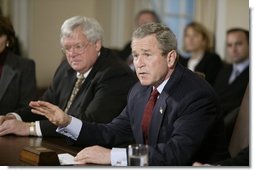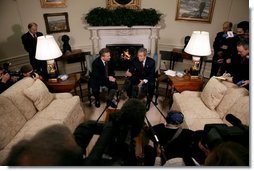
- Afghanistan
- Africa
- Budget Management
- Defense
- Economy
- Education
- Energy
- Environment
- Global Diplomacy
- Health Care
- Homeland Security
- Immigration
- International Trade
- Iraq
- Judicial Nominations
- Middle East
- National Security
- Veterans
|
Home >
News & Policies >
January 2004
|
For Immediate Release
Office of the Press Secretary
January 27, 2004
President Bush Welcomes President Kwasniewski to White House
The Oval Office
11:23 A.M. EST
PRESIDENT BUSH: I want to welcome my good friend, and a good friend of our country, to the White House. I appreciate so very much you coming by, Mr. President.
I've gotten to know this man well over the years. He is a leader, he understands that people need to lead their country towards peace and freedom and prosperity. And President Kwasniewski is doing just that. He's making a mark on the continent of Europe through his leadership. He stands strong.
 In every conversation I've had with him, he has a deep love for the
Polish people. He expresses his desire for close relations, because he
understands close relations between our countries is in the people's
interest.
In every conversation I've had with him, he has a deep love for the
Polish people. He expresses his desire for close relations, because he
understands close relations between our countries is in the people's
interest.
And Mr. President, I'm so glad you're back. I appreciate your friendship, I appreciate your strength. Welcome.
PRESIDENT KWASNIEWSKI: I was talking Polish because I see Polish TV here. (Speaking Polish.)
And now to Americans --
PRESIDENT BUSH: We'll answer some questions here.
PRESIDENT KWASNIEWSKI: Some questions and maybe short statement to you, because --
PRESIDENT BUSH: Absolutely, they love to be informed.
PRESIDENT KWASNIEWSKI: -- you understand Polish, or not fully?
PRESIDENT BUSH: Well, he speaks French, but not Polish. (Laughter.)
PRESIDENT KWASNIEWSKI: French is the next time, not yet.
I would like to say that it is a tradition, we began each year with this Polish-American consultation. Last year was very important, difficult. We are together as allies in Iraq. I'm sure that we have all chances to finish this mission with success, in favor of Iraqi people, in favor of the security in the world, in favor of all of us. And this visit I hope will be very good to solve some of our bilateral issues, which are necessary to eliminate in our relations, because the people -- especially the people in Poland and Polish Americans, they expect very much to make the relations between Poland and the United States as excellent as possible, and with such friend as George W. Bush, I'm sure that they are ready to do.
PRESIDENT BUSH: Thank you, sir. Terry.
Q Mr. President, a year ago you said the dictator of Iraq has got weapons of mass destruction. Are you still confident that weapons of mass destruction will be found in Iraq, given what Dr. Kay has said?
PRESIDENT BUSH: Let me first compliment Dr. Kay for his work. I appreciate his willingness to go to Iraq and I appreciate his willingness to gather facts. And the Iraq Survey Group will continue to gather facts.
There is no doubt in my mind that Saddam Hussein was a gathering threat to America and others. That's what we know. We know from years of intelligence -- not only our own intelligence services, but other intelligence gathering organizations -- that he had weapons -- after all, he used them. He had deep hatred in his heart for people who love freedom. We know he was a dangerous man in a dangerous part of the world. We know that he defied the United Nations year after year after year. And given the events of September the 11th, we know we could not trust the good intentions of Saddam Hussein, because he didn't have any.
 There is no doubt in my mind the world is a better place without
Saddam Hussein. America is more secure, the world is safer, and the
people of Iraq are free.
There is no doubt in my mind the world is a better place without
Saddam Hussein. America is more secure, the world is safer, and the
people of Iraq are free.
You want to call on the Polish press?
PRESIDENT KWASNIEWSKI: Yes, please.
Q Polish Television, a question for Mr. President Bush. Mr. President, there is a feeling in Poland that America is not doing enough for Polish effort in Iraq. Are you planning to extend military support for Poland?
PRESIDENT BUSH: I look forward to talking to my friend about that today. In my '05 budget request there is a $66 million request to help the Polish military, particularly with airlift capacity, C-130 aircraft. The Polish army is a sophisticated, fine group of soldiers. And one area where Poland needs some help is capacity to move those soldiers, and we look forward to helping the government do that.
Q Mr. President, do you have any questions about the prewar intelligence? And the Democrats are wanting an independent commission to look into this. Would you go along with that?
PRESIDENT BUSH: First of all, I think it's very important for us to let the Iraq survey group do its work so we can find out the facts and compare the facts to what was thought.
The first part of your question was?
Q Do you have any questions about the prewar intelligence? Were you ill-served by the intelligence community?
PRESIDENT BUSH: Well, first of all, I've got great confidence in our intelligence community. These are unbelievably hardworking, dedicated people who are doing a great job for America. And, secondly, there is no doubt in my mind that Saddam Hussein was a grave and gathering threat to America and the world. There is just no doubt in my mind.
And I say that based upon intelligence that I saw prior to the decision to go into Iraq and I say that based upon what I know today. And the world is better off without him. And we're now in the business of making sure Iraq is free and democratic. And that's important as well for long-term stability and peace in the world. And we're making good progress toward that goal.
PRESIDENT KWASNIEWSKI: May I add one thing?
PRESIDENT BUSH: Sure, please.
PRESIDENT KWASNIEWSKI: Because it might be interesting for American journalists. Many months before Iraqi action, I met predecessor of Hans Blix in Warsaw. I invited him to my palace, and we discussed about mass destruction weapons, Iraq and everything. And he told me very important thing, that Saddam has these weapons or is ready to produce these weapons. Because to have such impression that he has mass destruction weapons is a part of his doctrine to keep own power in Iraq and to be strong in the region.
So I think that it's very difficult today to judge how it was when he had -- when he decided to continue this project of mass destruction weapons. But that was information of predecessor of Mr. Blix in Warsaw, that absolutely Iraq is ready to produce if it's necessary, to keep the power of -- and the dictatorship of Saddam and to play such important role in the region.
PRESIDENT BUSH: Yes, Dave.
Q Mr. President, but how do you describe and account for the difference between what you claimed prior to the war about what he possessed and what he was capable of, and what the intelligence said he possessed and was capable of in terms of a nuclear weapon within the decade, and the fact that David Kay says the intelligence was inaccurate and wrong, and nothing has been found? Don't you owe the American people an explanation?
PRESIDENT BUSH: Well, I think the Iraq Survey Group must do its work. Again, I appreciate David Kay's contribution. I said in the run-up to the war against Iraq that -- first of all, I hoped the international community would take care of him. I was hoping the United Nations would enforce its resolutions, one of many. And then we went to the United Nations, of course, and got an overwhelming resolution -- 1441 -- unanimous resolution, that said to Saddam, you must disclose and destroy your weapons programs, which obviously meant the world felt he had such programs. He chose defiance. It was his choice to make, and he did not let us in.
I said in the run-up that Saddam was a grave and gathering danger, that's what I said. And I believed it then, and I know it was true now. And as Mr. Kay said, that Iraq was a dangerous place. And given the circumstances of September the 11th, given the fact that we're vulnerable to attack, this nation had to act for our security.
Q -- visas for Polish tourists coming to the United States?
Q Visa. Visas -- do you offer anything on the visa policy for the Polish people?
PRESIDENT BUSH: Well, we're working with the President on this very delicate issue. And there is the opportunity for some pre-screening to make sure that Polish citizens headed to the United States are not inconvenienced. We've got a study group we're going to put together to make sure that we come up with rational policy. But let me make sure everybody understands: the Congress decides the visa policy. That's what the Congress decides. And our study group will work with the Polish authorities in a way that makes it clear what the realities are here in the United States and makes it clear what the realities are on the ground in Poland.
Listen, let me just take a step back on this very important issue. We value our friendship with Poland. Poland is our great friend. There are thousands of Polish Americans who --
PRESIDENT KWASNIEWSKI: Millions.
PRESIDENT BUSH: Millions, excuse me. I just don't want to overstate the case here. (Laughter.)
PRESIDENT KWASNIEWSKI: Especially before the election. Millions and millions. (Laughter.)
PRESIDENT BUSH: That love Poland and that have got relatives in Poland. And we understand the need for dialogue and travel. We've got visa rules set by the Congress that we just -- that are on the books. And we look forward to working with the President on these issues.
PRESIDENT KWASNIEWSKI: We will work, of course, but I would like to deliver this idea to you and to our friends. The future of the world is without visa, not with visa. That should be our goal.
PRESIDENT BUSH: Yes.
PRESIDENT KWASNIEWSKI: And, of course, how to reach this important goal, that is task for politicians, because the future of the world, with Poland, with Eastern Europe, with the world is no visa, not visa. That's -- me, very modest citizen of Poland, I speak to you. That is the future. That is the future.
PRESIDENT BUSH: Well, it could be. Let me also say that I announced a very important piece of legislation, or called Congress to an important piece of legislation, which is to issue temporary worker cards, which will help address much of the issue with the Polish people. And I would hope Congress would pass rational immigration policy -- that is not amnesty -- rational immigration policy that matches willing worker with willing employer. And that also will help on this issue.
PRESIDENT KWASNIEWSKI: It will help very much. We appreciate it very much. But, please, the President, the future is no visa.
END 11:36 A.M. EST


